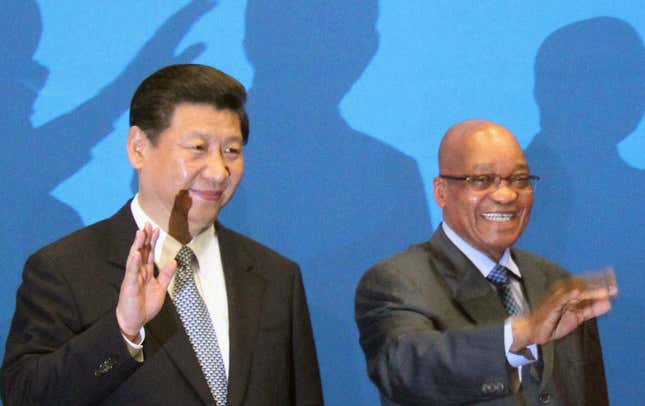
China received two strong signals of African resistance to its growing presence in the continent on Wednesday. In the central African state of Gabon, the government is preparing to wrest back control of oil assets (paywall) from three international companies when their contracts expire in 2015, including China’s Sinopec. Separately, Ghanaian authorities detained 124 Chinese workers suspected of illegal gold prospecting.
This puts the Chinese government in an awkward position. Gabon insists that the targeted oil companies show “irregularities” in their paperwork. The Sinopec subsidiary, Addax, has already been stripped of assets last year for “flagrant non-respect of the law.” Beijing is keen to show that the huge number of Chinese businesses operating abroad offer a positive impact on their local communities, but it is also concerned that the Gabon government is using alleged corruption as a reason to move control of oil assets back to its state-owned company.
In Ghana, 124 illegal prospectors is small change compared to some estimates—there may be as many as 50,000 of them searching for gold in the country. But while China may be content to allow Ghana to prosecute its citizens, Chinese media have reacted defensively, reporting that Chinese residents have been victimized by locals and the military police.
These two incidents are only the latest in a long line of pushbacks to China’s increasing presence in the region. In February, for example, Zambia revoked a Chinese company’s licenses to operate coal mines due to poor safety and environmental compliance.
Chinese investment was once welcomed with enthusiasm in Africa. In 2000, Beijing actively began a program of accelerated engagement, which boosted trade between China and Africa by over 200 times (paywall), to $200 billion in 2012. African engagement with China is still growing, but attitudes have changed.
Many Chinese companies prioritized growth over the environment and local quality of life, to the anger of local residents. Africans felt ripped off by Chinese who settled in vast numbers, endured tough conditions and worked for low wages. This bred financial success, but also put African companies out of business. “The way it looks, one day there will be a big fight with them,” one Malawian told Reuters last year, “one day there will be blood.”
Africa is certainly not about to dump China completely. It is too reliant on Chinese manufacturing and infrastructure investment. China was famously a bigger donor to Africa than the World Bank in recent years, but many poor Africans don’t feel like this money has really made their quality of life better. In many cases, it’s quite the contrary—China is seen as the best friend of corrupt despots and dictators. That reputation will have to change.
But the biggest bugbear for Africans appears to be Beijing’s relaxed attitude towards environmental degradation and exploitation. This is a problem for China both at home and abroad. President Xi Jinping, in a tour of Africa in March, tried to assuage concerns that China was suffocating Africa. “China has and will continue to work alongside African countries to take practical measures to appropriately solve problems in trade and economic cooperation so that African countries gain more from that competition,” he said.
To an extent, China is just a victim of its own success in obtaining resources in Africa, and exporting workers who are willing to suffer hardship abroad in return for a chance at success. But if it wants to continue to be seen as a partner rather than a competitor, it needs to start instituting sustainable business practices and making more friends—not just in presidential palaces.